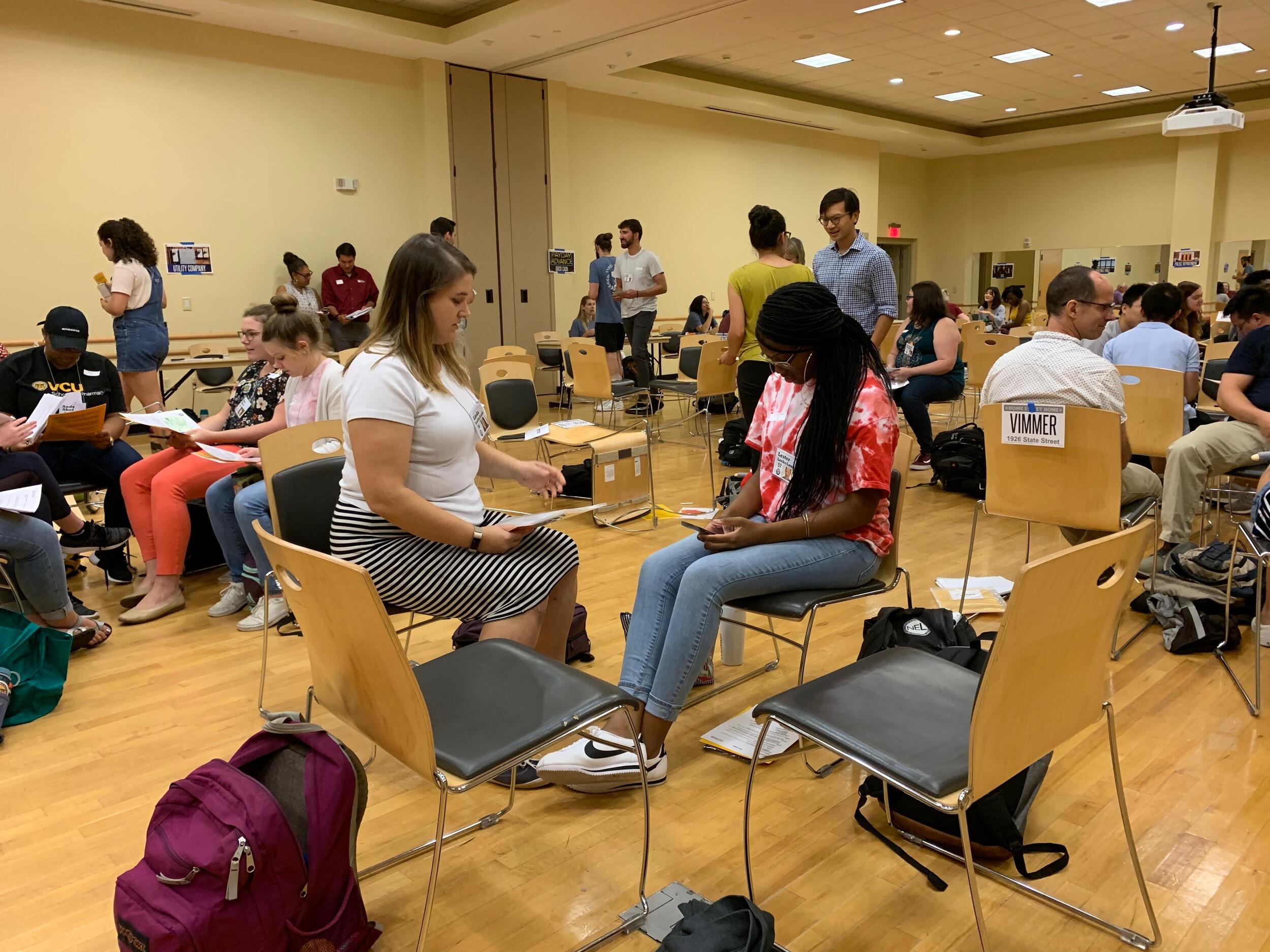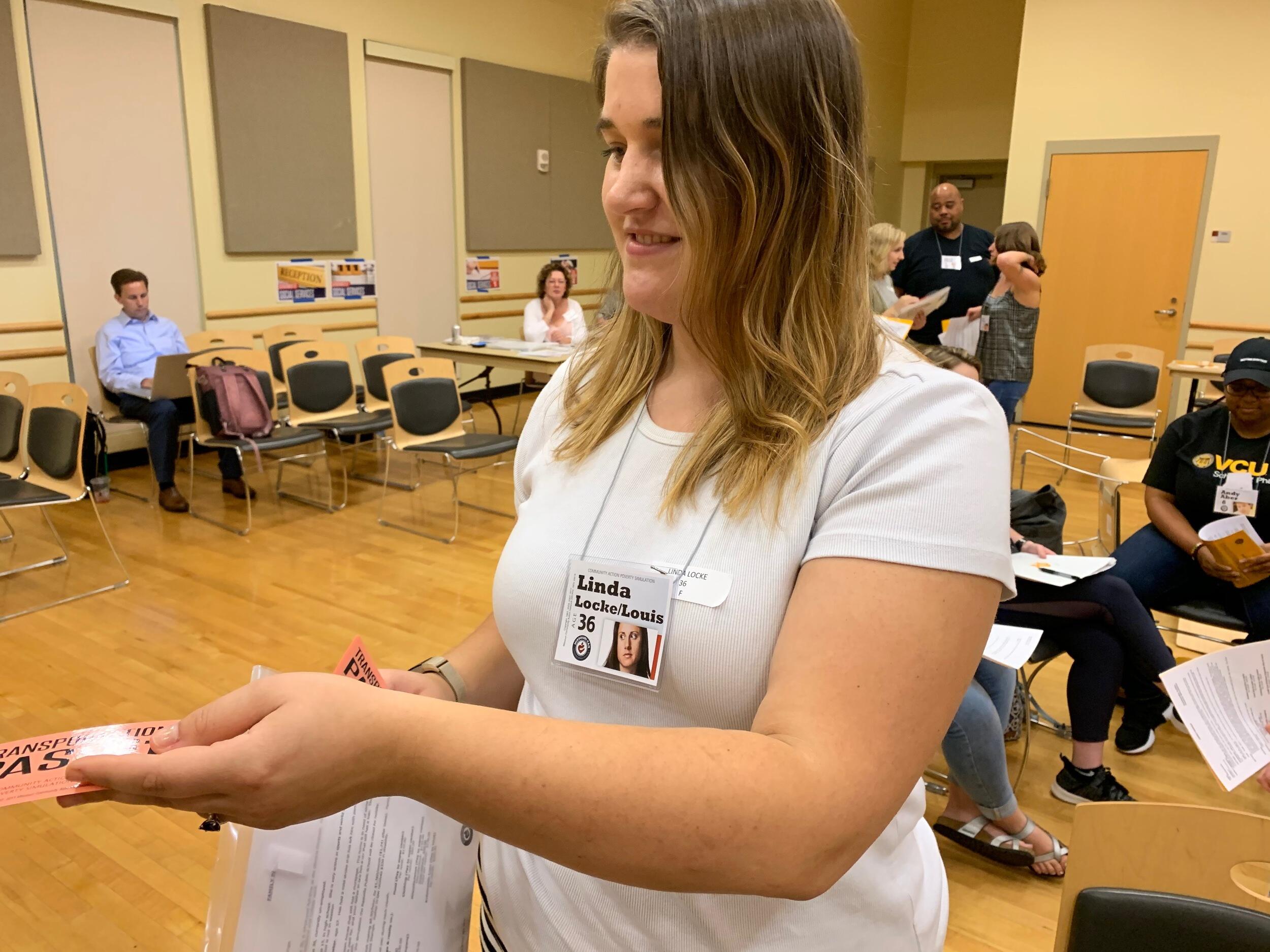
Sept. 9, 2019
'It's choreographed chaos': Just two hours of poverty teaches students a profound lesson
Share this story
After being evicted, 25-year-old Jack Jolly paid his rent and returned home only to find that his girlfriend, 19-year-old Joyce Jacobi, had lost their baby, Josh.
Jacobi had been concentrating so hard on paying their bills that she had forgotten the baby at home, where social services found him.
Thankfully, this horrifying scenario was not real, but rather part of the inaugural interprofessional poverty simulations at Virginia Commonwealth University designed to sensitize its health profession students and create a broader awareness of the realities of poverty. The Virginia Cooperative Extension in partnership with the VCU Center for Interprofessional Education and Collaborative Care ran the simulation.
“We take care of so many patients that face so many barriers in life,” said Alan Dow, M.D., assistant vice president of the center and professor of internal medicine at the VCU School of Medicine. “As a doctor, it's actually not all that hard to figure out what's wrong with them and what we need to do. But at times, it's really hard to figure out how to actually make that happen. Poverty is one of those barriers. There's lots of other barriers, but poverty is one of the biggest barriers that we just struggle with.”
More than 400 students participated in the simulation where they had to provide for basic necessities and shelter on a limited budget during the course of four 15-minute “weeks.”
“During those 15 minutes, the participants actually have to go through and meet goals,” said Elizabeth Micalizzi, administrative director of the Center for Interprofessional Education and Collaboration. “For example, you need to feed your family. You need to go to work. You need to keep the lights on.”
We throw in some reality. Not everybody has a car. You need public transportation and sometimes public transportation is late. If you've arrived to do your job late, you don't get paid, therefore you can't feed your family. It's designed to be fast-paced and stressful. It's choreographed chaos.
However, as in real life, unexpected obstacles arise.
“We throw in some reality,” Micalizzi said. “Not everybody has a car. You need public transportation and sometimes public transportation is late. If you've arrived to do your job late, you don't get paid, therefore you can't feed your family.
“It's designed to be fast-paced and stressful. It's choreographed chaos.”
The entire simulation takes place in a large room with the impoverished families housed in groups of chairs. The room’s perimeter is lined with various services, such as a utility company, a school and a child care facility.
Players are randomly assigned a persona and household. Some houses are multigenerational, while others might be occupied by an older adult who lives by himself.
A police officer can put people in jail based on how they look, what they're doing or where they are. A professor might kick a student out of class if she brings her baby. An illegal activities person goes around selling drugs and laundering money.

Kayla Burfoot, a first-year master of social work student, played 57-year-old Lester Locke, who lives with his daughter’s family.
“He has had a mild stroke that has left him with a partial paralysis, so he really can't do that much so that's why he stays at home,” Burfoot said.
Her classmate Mary Barnett role-played Lester’s daughter Linda, who is unemployed because that’s the only way she has enough time to take care of the household.
“My husband is a general employee and works 40 hours a week and makes above minimum wage at $8.50 an hour,” she said. “State minimum wage is $7.50. After taxes we make $1,241 per month, which is about $310 each week,” Barnett said. “I feel so frazzled right now to be honest. I wasn't able to care for my child and be able to get her the Valentine's Day thing that she was supposed to do.
“I don't know how I'm supposed to take care of my father. I know that's a burden that a lot of people face and is such a part of reality, and the cost of care is getting so expensive and Medicaid doesn't cover everything. And so I don't know.”
In the role of Lester, Burfoot feels as though she can't contribute.
“I can't help,” she said. “I'm sitting and waiting for things to kind of just fall into place.”
The simulation opened her eyes to what it means to live in poverty, Burfoot said.
“It highlights what populations may be at a disadvantage when it comes to trying to obtain certain services or access to certain services and just the day-to-day tribulations that they may go through in trying to get basic needs.”
Subscribe to VCU News
Subscribe to VCU News at newsletter.vcu.edu and receive a selection of stories, videos, photos, news clips and event listings in your inbox.










